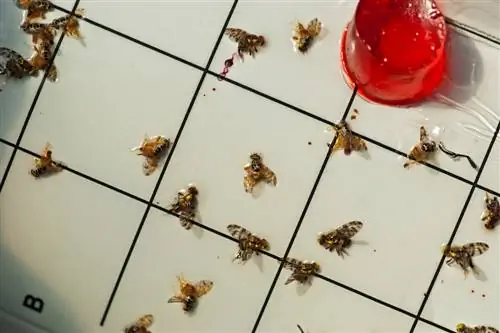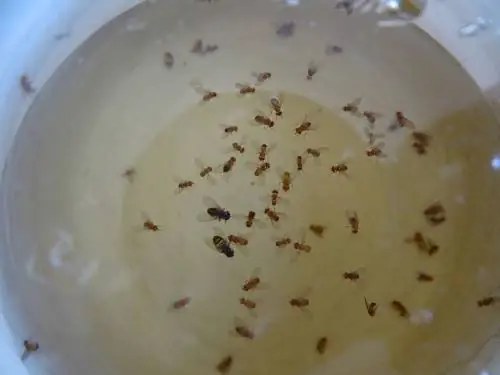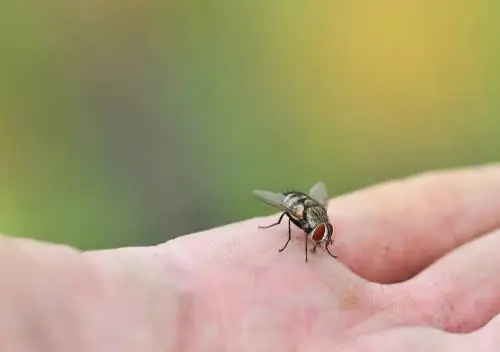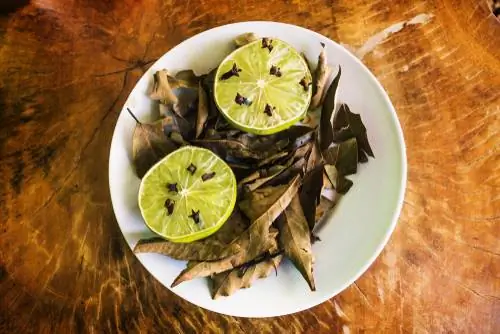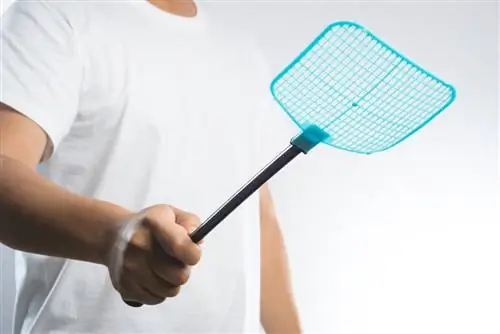- Author admin leonars@hobbygardeners.com.
- Public 2023-12-26 14:17.
- Last modified 2025-06-01 06:02.
Fruit flies usually come out of nowhere and seem to multiply rapidly. No wonder, because each of the tiny females lays up to 400 eggs at once! Read about the best way to catch and get rid of annoying fruit flies.
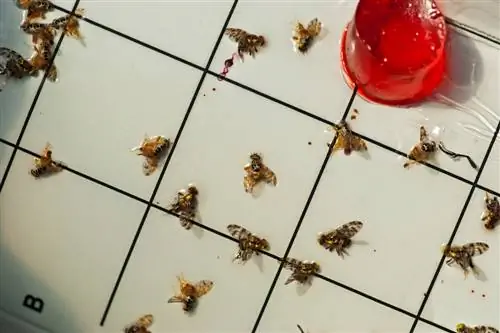
What is the best way to catch fruit flies?
To effectively catch fruit flies, you can use a homemade trap made from fruit juice, vinegar and dish soap or attract them with sweet wine, beer or champagne. Alternatively, carnivorous plants or the scent of basil and lavender can help.
Catch fruit flies - The best methods
Every year the same game starts all over again: As soon as the temperatures rise in summer, the fruit flies infest heavily filled fruit bowls in the kitchen, feast on sweet drinks (that you carelessly left open) and sometimes develop a real plague. As their name suggests, the little pests love ripe, sweet fruit (best when it is already overripe), but they also don't stop at vegetables and other sweet and sour food or drink leftovers. Fortunately, you can catch the beasts using simple means. By the way: fruit flies are not dangerous to people or pets. The animals do not transmit any diseases and do not bite or sting. They're just pretty unappetizing.
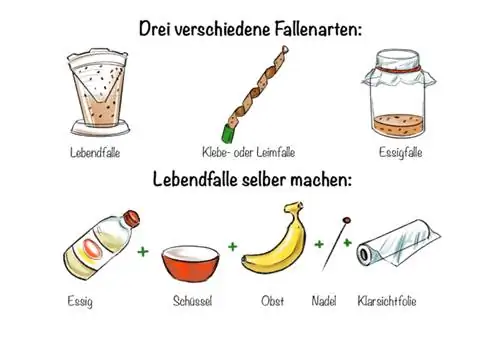
Fruit fly trap from the market
Various traps for fruit flies (also known as fruit flies, vinegar flies or fermentation flies) are available commercially, most of which use an attractant. This is usually a smell reminiscent of slightly rotten fruit, which lures the pests into the trap. You have the choice between different models:
- Glue or glue trap
- Livetrap
- Vinegar trap
These work in a very similar way to self-made fruit fly traps, but are significantly more expensive. Basically, buying it is unnecessary because you most likely have the ingredients you need for such a trap at home anyway.
Build your own fruit fly trap
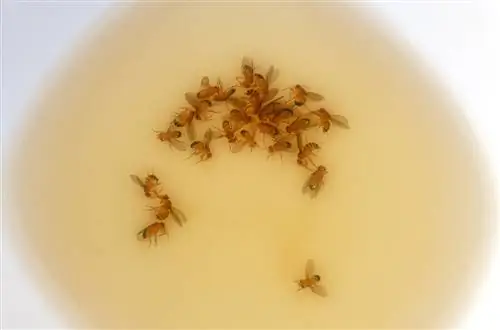
Juice, vinegar and dishwashing liquid attract fruit flies and spell their demise
Probably the best-known home remedy for catching fruit flies consists of a mixture of fruit juice (usually apple juice), a little vinegar and a small splash of dish soap. The latter is intended to remove the surface tension from the liquid so that the animals sink and drown. All fruit fly traps take some time before the animals find them. You can check one of these for the first time about an hour after setting it up and see how well your mixture works. If the fruit flies don't respond, try a slightly different ratio or mixture.
Tip
Since liquids evaporate quickly during the hot summer months, you should replace fruit fly traps at least every two to three days.
Fruit trap against fruit flies
video: Youtube

You don't necessarily have to kill the fruit flies, you can also catch them alive. Plus
- Place a few drops of fruity vinegar (e.g. apple cider vinegar) in a small bowl
- Cut some ripe fruit (e.g. bananas, grapes, pears, etc.)
- and put this in the bowl too.
- Then stretch a piece of cling film over the bowl
- and make a few holes in it with a needle.
- Now place the trap near the largest concentration of fruit flies
- and wait at least an hour.
- The flies, attracted by the irresistible scent, find a way into the bowl,
- but due to the lack of orientation no one can come out.
Now you can take the bowl outside and release the animals there. To do this, make sure you are further away from the house, otherwise you will soon have the animals back in the apartment. Fruit flies have an extremely sensitive sense of smell, with which they can perceive the seductive sweet and sour scents from afar and are attracted by them.
Catch fruit flies with vinegar
For the classic (and usually excellent) vinegar trap, mix 50 milliliters of apple juice (or another light fruit juice) with a tablespoon of fruit or brandy vinegar and a small splash of dishwashing liquid. In fact, a tiny splash is enough, because the detergent is only intended to reduce the surface tension of the mixture so that the light animals sink into it. However, they are not allowed to taste it, otherwise the trap will not work.
Fruit fly trap without vinegar
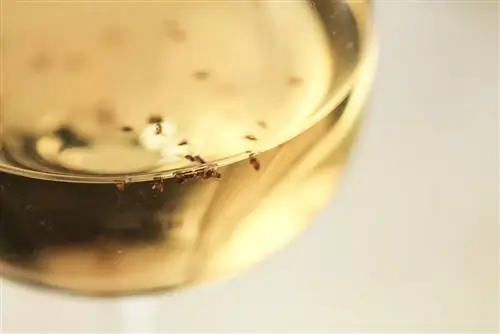
Fruit flies love wine
If you don't like the smell of vinegar, you can also catch fruit flies with the help of these liquids:
- Wine: A sweet white or rosé wine is also very suitable for catching fruit flies. Simply fill a small remainder into a bowl or leave it in the bottle - then you can immediately dispose of the bottle along with the flies.
- Beer: The same applies to fermenting beer, which sometimes smells even more tempting to fruit flies than wine.
- Sparkling wine: Even a small amount of sweet sparkling wine works great.
In addition to fruits and vinegar, fruit flies are also attracted to yeast, which is why a yeast-based liquid mixture can also be used as an attractant. To do this, mix a packet of dry yeast with a tablespoon of sugar and enough water in a bowl to create a milky liquid. Simply place these near the fruit flies and wait for at least an hour.
Carnivorous plants against fruit flies
Carnivorous plants are also quite reliable when it comes to catching fruit flies. Venus flytrap, sundew or butterwort: These plants attract the animals with their sweet, sticky drops and then quickly snap. However, in order to control a fruit fly infestation with these plants, you need several of them. It's best to place them near the swarm and wait a few days.
Excursus
Which plant scents help against fruit flies
Just as fruit flies are irresistibly attracted to fruity smells, other scents repel them. One or more pots of basil in the kitchen - ideally directly on the windowsill or (if it is light enough) next to the fruit basket - also keep the fruit fly plague at bay.
How to prevent fruit fly infestation
“When cleaning, never forget the second drain on the sink!”
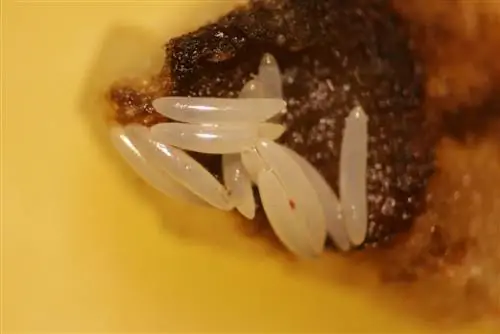
Each female fruit fly lays up to 400 eggs
Anyone who has ever had to fight a plague of fruit flies knows how difficult the insects are to get rid of. Each individual female lays up to 400 eggs - from which adult and sexually mature fruit flies develop within just around ten days. So it's no wonder that the animals are multiplying so explosively! Before you have to go to the trouble of catching fruit flies, it's better to invest time and attention in prevention. If you follow a few simple rules, fruit flies will no longer stand a chance in your kitchen. With these tips you can keep fruit flies out of your apartment or house permanently:
- Never leave fruit out in the open.
- A fruit basket is decorative, but it is sure to attract animals.
- Store fruit in the refrigerator.
- Even if there are eggs and larvae on the fruit, they die in the cold.
- If that is not possible, you should cover the fruit with a hood.
- A few cloves added also keep the insects away.
- Fruit flies don't like this smell.
- Take out the trash every day in summer.
- Clean the trash cans regularly and thoroughly.
- Fruit flies like to nest in it.
- Clean and disinfect all drains regularly.
- The dishwasher's solids filter also needs to be cleaned frequently.
- Do not leave any beverage bottles (including empty deposit bottles!) open.
- Wash used dishes promptly.
Where do fruit flies come from?
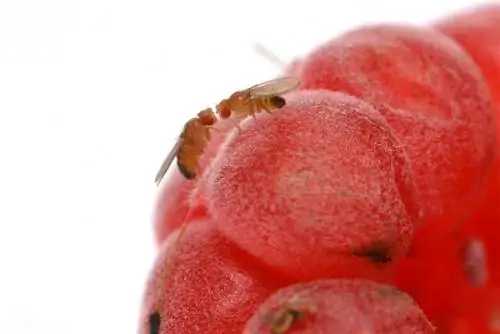
Fruit flies often already live in the fruit
Fruit flies not only enter the apartment through the open window, but mainly through fruit bought in the supermarket or at the weekly market. This often already contains fruit fly eggs and larvae, which, provided they have good living conditions at home, will multiply quickly there. So make sure right from the start that the little animals don't feel comfortable with you! By the way: Washing fruit thoroughly before eating removes most of the eggs and larvae attached to the shell.
Frequently asked questions
Why do I have fruit flies in my apartment in winter?
Of course, there are no adult fruit flies in nature in winter; after all, they can no longer find enough food outside. In the apartment, however, there are ideal breeding conditions even in the cold season, and there is enough food there all year round. That's why the animals reproduce diligently in winter, with the eggs or larvae being carried home from the supermarket together with the fruit.
How can I avoid accidentally eating fruit fly eggs or maggots with my fruit?
The only way to avoid adding unwanted protein to your fruit meal is to wash and/or peel the fruit thoroughly. However, it doesn't matter whether you use cold or warm water. However, you won't catch all the eggs and maggots here either.
Are there also black fruit flies that come out of potting soil?
If the supposed fruit flies are black and come from the (possibly newly purchased) potting soil, then they are fungus gnats. You can also combat these with vinegar, but also with baking soda or baking powder containing soda.
Are vinegar flies and fruit flies the same thing?
Zoologically correct, fruit flies are actually called fruit flies. Fruit fly or fruit fly is just a popular name that refers to the animal's favorite food. In some regions of Germany, Drosophila (the Latin species name) is also called the vinegar fly because the animals also fly on vinegar - probably because it reminds them of the characteristic smell of rotting fruit. So vinegar flies and fruit flies are actually the same species.
How old do fruit flies get?
The larval and pupal phases of fruit flies only last about four days, then the sexually mature adults hatch after another 24 hours. Female fruit flies can then reach an age of between two and eight weeks, while males can live for a maximum of ten days.
Tip
Fruit flies don't like the smell of lavender any more than they like the smell of basil. Therefore, set up pots with blooming lavender, hang scented sachets with dried lavender in the rooms or use a room spray with a lavender scent. This helps keep the critters away.

